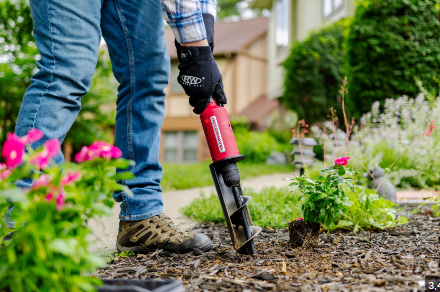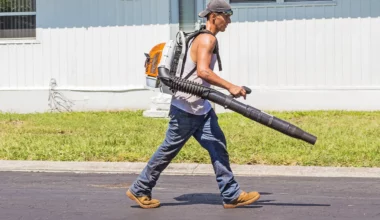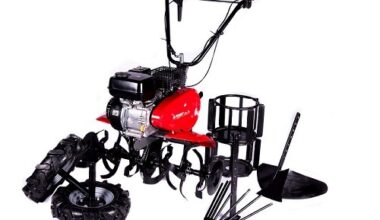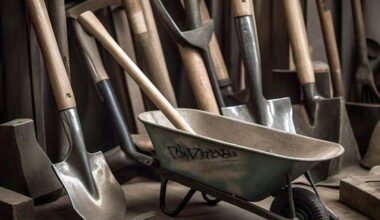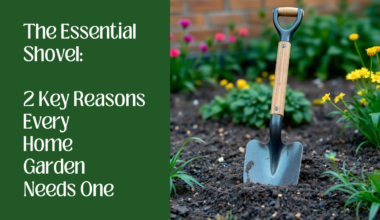Ever feel like you’re chipping away at concrete in your backyard? Digging into hard ground can be a daunting task. But don’t sweat it—there are power tools designed to make your life easier.
Power tools like tiller/cultivators and sod-cutters are built to quickly and affordably dig through a few inches of hard earth. They’re perfect for slopes and can even tackle the occasional 3″ rock.
Ready to discover best power tools for digging hard ground? Let’s explore the top 3 options to simplify your next excavation project.
Understanding the Challenges of Hard Ground Digging
Digging through hard ground can be a real challenge. You might encounter different soil types that make it harder. Sand is easy to dig because it drains quickly. But clay is tougher, requiring more time and effort.
Types of Hard Ground Surfaces
Different surfaces bring their own set of challenges for digging:
- Sand: Drains quickly, needs less power to dig
- Clay: Dense, requires more time and effort
- Frozen ground: Tough to break through
- Concrete: Needs special tools for removal
Impact of Climate and Geography
Where you live greatly affects your soil conditions. Hot areas often have harder soil. Cold regions face frost heave, which can push posts out of the ground.
Importance of Choosing the Right Tools
Choosing the right tools is crucial for safe and efficient digging. For small jobs, manual earth augers are great. But for larger tasks, portable power augers are faster.
Always call 811 before digging to avoid hitting buried lines. Safety is key in hard ground digging. Wear protective gear and follow the right procedures for your tools.
Power Tools for Digging Hard Ground: Top Options and Uses
Digging hard ground can be tough, but the right power tools make it easier. Let’s look at some top options for tackling tough terrain.
1. Gas-Powered Earth Drills
Gas-powered earth drills are great for digging deep holes in hard soil. They have high torque and can handle various auger sizes. Ideal for fence post installation, tree planting, and soil sampling projects.
2. Electric Earth Augers
Electric earth augers are quieter and eco-friendly compared to gas models. They’re perfect for smaller jobs and where noise is a concern. Many models have interchangeable auger bits for different hole sizes.
3. Pneumatic Earth Drills
Pneumatic earth drills use compressed air to power through tough soil. They’re lightweight and easy to move, great for tight spaces. These drills work well in rocky or clay-heavy soils where other tools might struggle.
4. Demolition Tools for Excavation
For the toughest jobs, demolition tools are key. Jackhammers and breakers can break up concrete, frozen ground, and compacted soil. These tools quickly clear obstacles that are hard to dig through by hand.
- Handheld breakers for smaller areas
- Hydraulic breakers for large-scale projects
- Demolition hammers for precision work
When picking power tools for hard ground, think about the project size, soil type, and power source. With the right gear, you can efficiently and safely handle even the toughest digging tasks.
Manual vs. Power Tools for Hard Ground Digging
When you’re up against hard ground, you have to decide between manual and power tools. Each type has its own benefits, based on what you need for your project and the conditions you’re working in.
Manual tools like spades, shovels, and digging bars are perfect for small tasks and simple projects. Spades have a square blade and a long handle, ideal for cutting through hard soil. Shovels are great at scooping up loose materials. For really hard soils, trenching spades with narrow, long blades are your go-to.
Power tools, such as augers and handheld breakers, make digging larger or complex areas easier. They save time and energy, especially when you’re up against hard ground. Electric earth augers are quieter and easier to maintain than gas-powered ones.
Think about these points when picking between manual and power tools:
- Project size: Hand tools are great for small gardens, but power tools are better for big areas.
- Soil type: Manual tools work well on loose soil, but you’ll need power tools for compacted ground.
- Budget: Manual tools are cheaper upfront, making them perfect for beginners or occasional use.
- Noise levels: Hand tools are quieter, ideal for areas with noise rules.
For flexibility, keep both manual and power tools in your kit. This way, you’re ready for any digging job, from detailed garden work to big excavations.
Factors to Consider When Choosing Digging Power Tools
Choosing the right digging power tools is key to a successful project. It’s all about picking the right equipment for the job.
Project Size and Scope
The size of your project is important when picking digging tools. For a small area, like a 22′ x 22′ space, mid-sized tools work well. But for bigger projects, you’ll need more powerful tools.
Walk-behind trenchers with 12-31 horsepower can dig up to 48 inches deep. Ride-on trenchers with 49-131 horsepower can go as deep as 6 feet.
Ground Composition
The type of ground you’re working with matters. Soft soils might only need augers or spades. Hard grounds might need breakers or pick axes. And for rocky areas, tools designed for stones are best.
Remember, different projects need different depths. Electrical wiring trenches are usually 6 inches deep. Drainage trenches can be 18 inches deep.
Power Source Availability
The power source for your tools is crucial. You can choose from gas, electric, or pneumatic tools. Gas tools are mobile but need fuel. Electric tools are quieter and don’t make a mess but need a power outlet. Pneumatic tools are strong but you’ll need an air compressor.
Budget Considerations
Your budget will guide your tool choices. Find a balance between cost and the tool’s ability to handle your digging needs. For some projects, renting specialized tools like trenchers or augers might be necessary. But for smaller tasks, versatile hand tools like spades, forks, or trowels can save money.
Think about project size, ground type, power source, and budget when picking digging power tools. This way, you’ll be ready to handle your excavation tasks efficiently and effectively.
Safety Precautions and Best Practices
When using power tools for digging, safety comes first. It’s key to follow digging safety steps to avoid accidents and make excavation smooth. Always wear protective gear like strong boots, gloves, and safety goggles. Before using a tool, read its manual to know how it works and its limits.
Always check for underground utilities before digging. This is crucial for avoiding dangers from gas or electric lines. For gas tools, work in areas with good airflow to avoid breathing in harmful fumes. Be careful with electric tools in damp places to prevent shocks.
Keep a good posture while digging to avoid strain and take breaks to stay fresh. These tips not only keep you safe but also make your work better. Remember, digging can be more dangerous than regular construction, so stay alert.
- Wear appropriate Personal Protective Equipment (PPE)
- Check for underground utilities before digging
- Ensure proper ventilation for gas-powered tools
- Take regular breaks to avoid fatigue
- Maintain tools regularly for safe operation
Follow these safety steps to keep yourself and others safe on the job. By doing so, you can greatly lower the chance of accidents and make the work area safer for all involved in digging.
Conclusion
Choosing the right power tools for hard ground digging is key to your project’s success. Tools like gas-powered earth drills and electric augers are made for tough terrain. Make sure your tools match your project’s needs, like soil type and depth.
For clay or rocky soil, tools like mattocks and clay spades are essential. Power tools are great for big projects, but manual tools work well for smaller tasks. It’s important to have different tools for different situations.
Think about what you need for your project and the ground you’ll be digging in. This way, you can pick the best power tools for hard ground digging. It helps you tackle any challenge efficiently and safely. Always put safety first when using these powerful tools.

